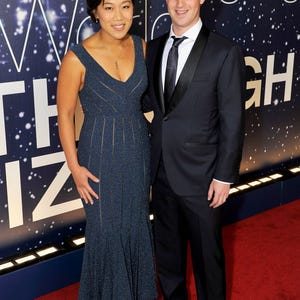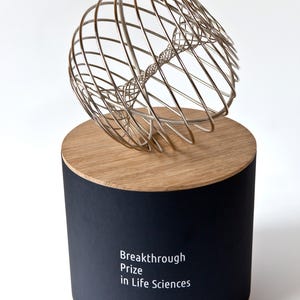
Not sleeping at your desks anymore, are you?
Meet Ryan Chester, 18, whose quirky video - https://www.youtube.com/watch?v=CYv5GsXEf1o - explaining Albert Einstein’s mind-bending Special Theory of Relativity won the inaugural Breakthrough Junior Challenge Sunday. The prize nets the North Royalton (Ohio) High School senior $250,000 toward college; $50,000 for Rick Nestoff, the physics teacher that inspired him; and $100,000 for a new school science lab.
Parents, take note: That's not too shabby a haul in exchange for a zippy 7-minute clip.
The Breakthrough Junior Challenge is a new kid-focused offshoot of the Breakthrough Prize, which leverages an array of foundations to award $3 million each to those making leaps in the fields of math, life sciences and physics. The awards for both competitions are being handed out at a ceremony in San Jose, Calif. Sunday. It is being televised live at 7 p.m. PT on National Geographic Channel , and gets an encore broadcast on the Fox network Nov. 29 on Fox at 7 p.m.
The Breakthrough Prize was started by a group of all-star tech couples: Google founder Sergey Brin and his ex-wife, 23andMe founder Anne Wojcicki ; Russian entrepreneur Yuri and Julia Milner; Alibaba founderJack Ma and Cathy Zhang; and Facebook’s Mark Zuckerberg and his wife Priscilla Chan . The Breakthrough Prize and online learning site Khan Academy announced the teen-focused variant earlier this fall.
“When I got the call saying I won, Sal (Khan), he told me they got a lot of exceptional submissions, but I guess mine cracked them up,” says Chester.
That would be a reference to the part in Chester’s video where he’s riding in a van and the driver suddenly hits the brakes and sends the teen smashing head first into the front seats – a painful and comical representation of speed relativity.
The other aspects of the video that stood out for the selection committee, which included past Breakthrough Prize laureates and the award’s founders, was the simplicity and clarity of Chester’s approach.
In the opening shot, he’s in his backyard talking. What special effects are used – Chester is also an aspiring filmmaker – lean toward simplistic graphics and one green-screen sequence where a friend flies off on a spaceship. Such whimsy contrasts with the complex subject matter, three tenets of relativity in which Einstein laid out fundamental laws of the universe.
“The goal of this prize is simply to celebrate students that have a passion for science and turn them into rock stars,” says Khan. “Getting them to create video content for others opens up the possibility of reaching a whole new generation of students.”
Khan says what captivated him about Chester’s video was “the personality and humor” of his approach. He adds that making science approachable isn’t a nice-to-have, it’s a must-have.
“Many students think math and science is too tough, but at the same time we know that for most jobs today you really must interface with technology. It’s not an option. So bringing it to life in a way that is memorable is key.”
Chan, a pediatrician, says she remembers a moment when science was made real to her by way of her driver’s test.
“I was a junior in high school and I remember driving down a circular ramp and realizing, wow, the coefficient of friction of the tires against the pavement is what’s keeping me on the road,” she says. “That excitement of discovery, of science made real, that continues with me to this day.”
Chan focuses on various philanthropic endeavors largely tied to education. She and Zuckerberg recently announced they would be starting a school for underserved children in East Palo Alto, Calif.
“Mark and I are committed to advancing general human potential and simply making sure that everyone gets a fair shot, and science certainly is a big way to unleash the potential of children,” she says. “Often what’s difficult is making the leap from the theoretical to the practical. But when that can be effectively translated, like it is in Ryan’s video, then science really comes to life.”
Chester’s video was chosen from 14 finalists that made the cut from hundreds of videos emailed in from nearly 90 countries. Most finalists hailed from either the U.S. or Australia, and their videos included discourses on topics such as oncolytic virotherapy (Ritika Bharati, 16, U.S.), chromatic aberration (Michael Poon, 16, Canada) and RNA interface (Maria Portela , 16, Portugal ).
One might assume these kids are not spending too much time playing video games. But in truth, many likely have passions that run beyond science, much like Chester.
“I’m looking at colleges that have a great film school program as well as science,” says Chester, who admits that his winning video has suddenly broadened the scope of his college hunt. “I was looking at Ohio University , so I could maybe get a scholarship and not have crazy student loans. But now I’m looking at NYU andNorthwestern . I guess everything’s open to me now.”
He can thank his parents. And his teachers. And, most of all, Einstein.
Follow USA TODAY tech reporter Marco della Cava on Twitter @marcodellacava.


No comments:
Post a Comment